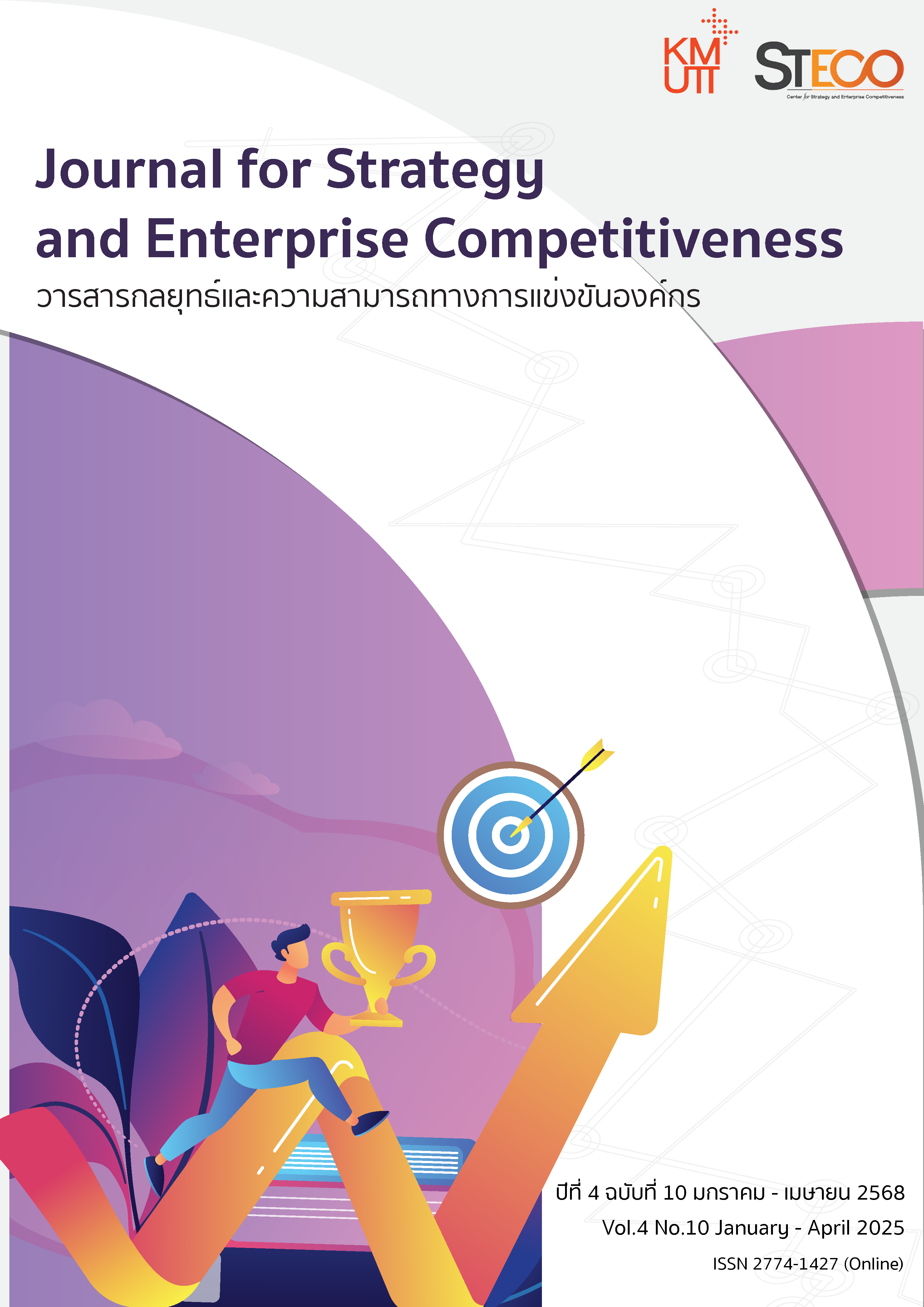Work-life Balance through the Eyes of Gen Z: A Multimodal Analysis of Multilingual Students' Perspectives
Keywords:
work-life balance (WLB), Gen Z, multilingual studentAbstract
This research study investigated how Gen Z multilingual students conceptualize work life balance (WLB) and explored how their academic backgrounds influence these perceptions. Using a multimodal discourse analysis approach, data were collected from video clips on the theme “Work-life Balance on Screen,” created by 180 university students who were learners of Thai, English, and Japanese at a private university in Bangkok, Thailand. Students were given creative freedom to portray their understanding of WLB in a multilingual format. Analysis revealed that participants conceptualized work-life balance in three ways: as personal well-being (55.56%), as a flexible lifestyle (33.33%), and as a struggle (11.11%). The study found that students' fields of study significantly influenced these conceptualizations, with Business Administration students primarily viewing WLB as personal well-being, IT students as a flexible lifestyle, and Engineering students as a struggle. The results reflect Gen Z's prioritization of relaxation, self-care, and mental well-being in their approach to balancing work and life.
References
Braun, V., & Clarke, V. (2006). Using thematic analysis in psychology. Qualitative Research in Psychology, 3(2), 77-101. https://doi.org/10.1191/1478088706qp063oa
British Educational Research Association (BERA). (2018). Ethical guidelines for educational research (4th edition). https://www.bera.ac.uk/publication/ethical-guidelines-for-educational-research-2018
Chillakuri, B. (2020). Understanding Generation Z expectations for better integration into the workplace. Journal of Organizational Change Management, 33(7), 1277-1296. https://doi.org/10.1108/JOCM-02-2020-0058
Clark, S. C. (2000). Work/family border theory: A new theory of work/family balance. Human Relations, 53(6), 747-770. https://doi.org/10.1177/0018726700536001
Creswell, J. W., & Poth, C. N. (2018). Qualitative inquiry and research design: Choosing among five approaches (4th edition). SAGE Publications.
Deloitte. (2023). Gen Z and Millennials Survey 2023: Shaping the future of work. Deloitte Insights. https://www2.deloitte.com/insights/us/en.html
Dewaele, J.-M. (2018). Why the multilingual mind matters. Foreign Language Annals, 51(1), 30-45. https://doi.org/10.1111/flan.12327
Frone, M. R. (2003). Work-family balance. In J. C. Quick & L. E. Tetrick (Eds.), Handbook of occupational health psychology (pp. 143-162). American Psychological Association. https://doi.org/10.1037/10474-007
Greenhaus, J. H., & Allen, T. D. (2011). Work–family balance: A review and extension of the literature. In J. C. Quick & L. E. Tetrick (Eds.), Handbook of occupational health psychology (2nd edition, pp. 165–183). American Psychological Association.
Guest, D. E. (2002). Perspectives on the study of work-life balance. Social Science Information, 41(2), 255-279. https://doi.org/10.1177/0539018402041002005
Hofstede, G. (2001). Culture's consequences: Comparing values, behaviors, institutions, and organizations across nations. SAGE Publications.
Hull, G., & Katz, M.-L. (2006). Crafting an agentive self: Case studies of digital storytelling. Research in the Teaching of English, 41(1), 43-81. https://doi.org/10.58680/rte20065995
Jayatissa, K. A. D. U. (2023). Generation Z – A New Lifeline: A Systematic Literature Review. Sri Lanka Journal of Social Sciences and Humanities, 3(2), 179-186. https://doi.org/10.4038/sljssh.v3i2.110
Jewitt, C. (2013). Multimodal methods for researching digital technologies. In S. Price, C. Jewitt, & B. Brown (Eds.), The SAGE handbook of digital technology research (pp. 250-265). SAGE Publications.
King, R., Lulle, A., & Buzaitė-Bručiunienė, I. (2021). The impact of multilingualism and migration on work-life balance: A European perspective. Journal of Ethnic and Migration Studies, 47(9), 2032-2050. https://doi.org/10.1080/1369183X.2020.1804190
Kossek, E. E., Baltes, B. B., & Matthews, R. A. (2011). How work–family research can finally have an impact in organizations. Industrial and Organizational Psychology, 4(3), 352–369. https://doi.org/10.1111/j.1754-9434.2011.01353.x
Kossek, E. E., & Lautsch, B. A. (2017). Work-life flexibility for whom? Occupational status and work-life inequality in upper, middle, and lower-level jobs. Academy of Management Annals, 12(1), 5-36. https://doi.org/10.5465/annals.2016.0059
Kotus, J., & Rzeszewski, M. (2022). Cultural diversity and work-life balance: The role of language in shaping professional identity. Cross Cultural Management Journal, 24(2), 105-122. https://doi.org/10.1108/CCM-2022-0050
Kress, G. (2009). Multimodality: A social semiotic approach to contemporary communication. Routledge.
Kress, G., & van Leeuwen, T. (2006). Reading images: The grammar of visual design (2nd edition). Routledge.
Kreiner, G. E. (2006). Consequences of work-home segmentation or integration: A person-environment fit perspective. Journal of Organizational Behavior, 27(4), 485-507. https://doi.org/10.1002/job.386
Patton, M. Q. (2015). Qualitative research & evaluation methods (4th edition). SAGE Publications.
Sapir, E., & Whorf, B. L. (1956). Language, thought, and reality: Selected writings of Benjamin Lee Whorf. MIT Press.
Schroth, H. (2019). Are you ready for Gen Z in the workplace?. California Management Review, 61(3), 5-18. https://doi.org/10.1177/0008125619841006
Shofiyyah, N. A., Komarudin, T. S., Muharam, A., & Juita, D. R. (2024). Characteristics of Generation Z and Its Impact on Education: Challenges and Opportunities. Journal Pendidikan Tambusai, 8(1), 5655-5668. https://doi.org/10.31004/jptam.v8i1.13298
Twenge, J. M. (2017). iGen: Why today’s super-connected kids are growing up less rebellious, more tolerant, less happy—and completely unprepared for adulthood. Atria Books.

Downloads
Published
How to Cite
Issue
Section
License
Copyright (c) 2025 Journal for Strategy and Enterprise Competitiveness

This work is licensed under a Creative Commons Attribution-NonCommercial-NoDerivatives 4.0 International License.
The opinions appearing in the content of articles of Journal for strategy and enterprise competitiveness. It is the opinion and responsibility of the article author. It is not the opinion and responsibility of the Center for strategy and enterprise competitiveness, King Mongkut's University of Technology Thonburi
Articles, information, content and images, etc., in the Journal for strategy and enterprise competitiveness. It is the exclusive copyright of the Center for strategy and enterprise competitiveness, King Mongkut's University of Technology Thonburi. If an individual or entity wants to distribute all or part of the content or for any action must obtain written permission from the Center for Strategy and enterprise Competitiveness, King Mongkut's University of Technology Thonburi.


